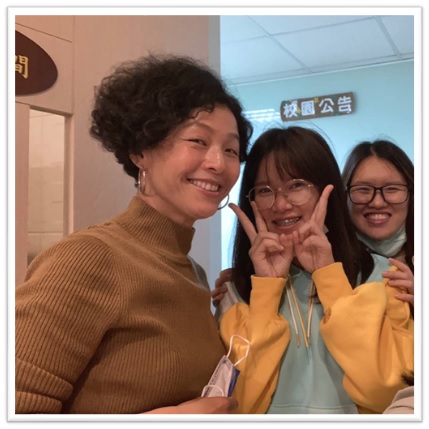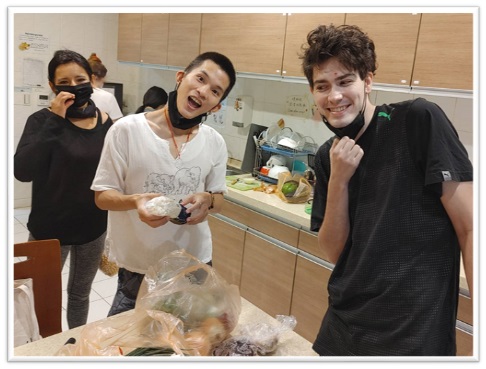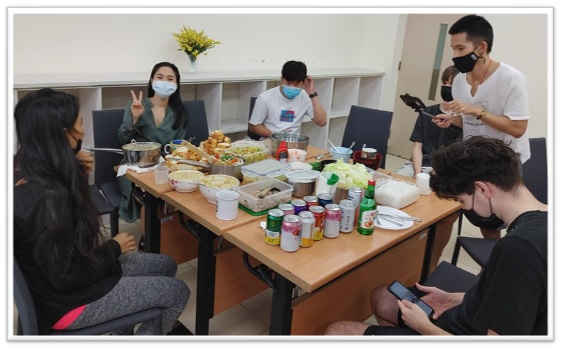Chinese Language Center Faculty- Gao Giao Zhen



Teaching Experience Sharing- Faculty- Gao Giao Zhen (Translated by Ada Chang)
This quarter, I had taught a special class. Most of the students were facing their difficulties and failure in learning Chinese. Some of the students had learned Chinese for about two years, but still cannot use Chinese properly to express themselves in daily life conversation. According to my teaching experience, this ability (daily life conversation), should be developed after learning Chinese for about half year. These students still felt hard about it.
The student, Rocio (Mexican), was facing with diverse situations on learning Chinese. With other difficulties in life, she suffered from depression. On the first day of class, she asked me, “Why do Taiwanese teachers keep asking students to do a lot of homework?” I am a teacher who known as assigning tons of homework. In fact, I don’t know how to answer this question. For me, a kid raised in Taiwan, to have a lot of homework is a natural thing. With my teaching experience, the one who does more homework, the more his/ her improvement will be significant. The content of the homework is usually related to the next day’s class. Students have to share their idea orally. If he/she did not do the homework, he/she will not even able to say a word. Unless, the one’s language ability reaches a certain level and able to play by ear. That will be what I expecting for.
Also, Rocio told me, she was studying in a Tauyuan’s University. The way of the teacher there teaching the beginner was without any English. There was once she wanted to ask the teacher a question in English (at the beginner level), she was scolded by the teacher. Other Asian students were with some basic knowledge of Chinese language. But she did not have any background knowledge at all. The teacher was quite strict. I listened to her learning experience and felt a little sad. Most of the western countries’ students, when they enter a class with a lot of Asian students they usually meet this situation. To learn how to write Chinese characters and how to speak at the same time are surely hard.
Ondrej also met this same problem. In the beginning, he had to learn speaking and writing at the same time. He naturally put more efforts on acknowledging and writing the characters. Thus, he would miss on learning speaking and listening skills. And that was kind of putting the cart before the horse on language learning. With the students who are having more struggles on learning, the teacher should focus on listening and speaking to make the learning process more effective.
Ondrej could not understand the sentence, “I cannot care about everything.” Or, he would ask me seriously, why we say “Qìchē (汽車 car) ” with “Qì (氣 air)” but not “Yóu (油oil)”. These two questions also made me feel hard to answer which I was not ever think about them once before. But, these questions actually reminded my own learning experience. I always want to get to the bottom of everything when I am learning a new thing. For example, there was once I had asked a docent about “why a dolphin gets more than 70 teeth?” in an ocean park. He rolled his eyes with the question. Ondrej is a big fan of science. Thus, we had to make a brief stop for analyzing every word during the class. He needed everything to follow the logic, but his was tangled in his own understanding of the grammar. I had to untangle and revised his background knowledge of the grammar.
Phirachat Kulsawasdee’s way of learning Chinese was completely different from Ondrej. He spoke Chinese by his feeling. He then was stuck in speaking Chinese by instinct. He could express his daily life fluently, but for the more formal and complete description in Chinese, he would be a little out of order. I told him, it’s alright, with more practice, everything would get better. The way of learning Chinese can really be diversity.
This quarter, I gave them less homework, and not stuck so much to the textbook. I chose to use the students’ life experience as the materials. All the contents they learned were related to their lives (They always cannot remember the new vocabulary, but with the words that are related to them, it is much easier). That method was useful for them. They surprisingly used the words they had learned during this quarter quite well. Rocio got a big improvement. Every teacher that had taught her before felt really happy for her. Along with the improvement on Chinese, she became confident again. That was the impression from her classmate, Dam Thi Thuy Phuong. Ondrej and Phirachat Kulsawasdee were also able to express themselves more completely. I feel happy for them, and knows them had put a lot of efforts on learning.

